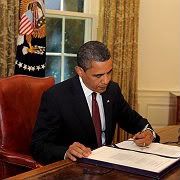
SPIEGELONLINE INTERNATIONAL: The occupant of the White House may have changed recently. But the amount of ill-advised ideology coming from Washington has remained constant. Obama's list of economic errors is long -- and continues to grow.
The president may have changed, but the excesses of American politics have remained. Barack Obama and George W. Bush, it has become clear, are more similar than they might seem at first glance.
Ex-President Bush was nothing if not zealous in his worldwide campaign against terror, transgressing human rights and breaking international law along the way. Now, Obama is displaying the same zeal in his own war against the financial crisis -- and his weapon of choice is the money-printing machine. The rules the new American president is breaking are those which govern the economy. Nobody is being killed. But the strategy comes at a price -- and that price might be America's position as a global power.
In his fight against terrorism, Bush had the ideologue Dick Cheney at his side. "We must take the battle to the enemy," he said -- and sent out the bomber squadrons toward Iraq on the basis of mere suspicion. The result of the offensive is well known.
Obama's Cheney
Obama's Cheney is named Larry Summers. He is Obama's senior-most economic advisor, and like the former vice president, he is a man of conviction. The financial crisis may be large, but Summers' self-confidence is even larger. More importantly, President Barack Obama follows him like a dog does its master.
The crisis, Summers intoned last week at a conference of Deutsche Bank's Alfred Herrhausen Society in Washington, was caused by too much confidence, too much credit and too many debts. It was hard not to nod along in agreement.
But then Summers added that the way to bring about an end to the crisis was -- more confidence, more credit and more debt. And the nodding stopped. Experts and non-experts alike were perplexed. Even in an interview following the presentation, Summers was unable to supply an adequate explanation for how a crisis caused by frivolous lending was going to be solved through yet more frivolity. >>> Gabor Steingart | Thursday, June 25, 2009